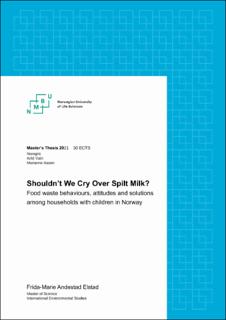| dc.description.abstract | The main objective of this thesis is to document research conducted at The Norwegian University of Life Sciences, on the behaviours, attitudes, and solutions regarding food waste deriving from households with children in Norway. The background and issues motivating this thesis include the high amounts of greenhouse gas emissions generated by food waste, the deprivation of valuable resources as a consequence, and private households standing for most of the waste. In Norway, the goal is to reduce the quantity of food waste 50% by 2030. As 60% of the total food waste in Norway derives from households, mostly households with children, this thesis aims to shed light on the habits, attitudes, and solutions that are beneficial in the reduction process. This objective was specified into the following research questions: (i) how much food waste is created from households with children; (ii) why are households with children wasting food; (iii) are the respondents from these households interested in reducing food waste; and (iv) what kind of measures do the respondents from these households believe should be implemented to reduce household food waste?
Being a part of the ACT-project at the Centre for International Climate Research (CICERO), an adapted theoretical framework from this project is employed, built mainly on theories from social psychology, institutional theory, and practice theory. Through quantitative data and 20 semi-structured interviews, the framework is used to identify archetypes and themes of analysis. Findings denote that several factors (e.g., personal norms, social norms, habits) influence food-wasting behaviours and attitudes. In general, respondents that reported a higher interest in food waste, also reported to be wasting less food. Moreover, the respondents who wasted the largest quantities of food were also the ones with the least interest in changing their food-wasting habits. Their suggested solutions depended on their attitudes and beliefs. For instance, respondents interested in health and nature suggested initiatives to influence norms, whereas respondents not interested in food waste proposed financial incentives. Two solutions are suggested for decreasing household food waste: (i) policies that target the individuals who waste the most, for instance through monetary bonuses; and (ii) individuals with different set of habits, norms, and attitudes should be gathered to spark reflections and changes in the food culture and how one views food-wasting practices. | en_US |

